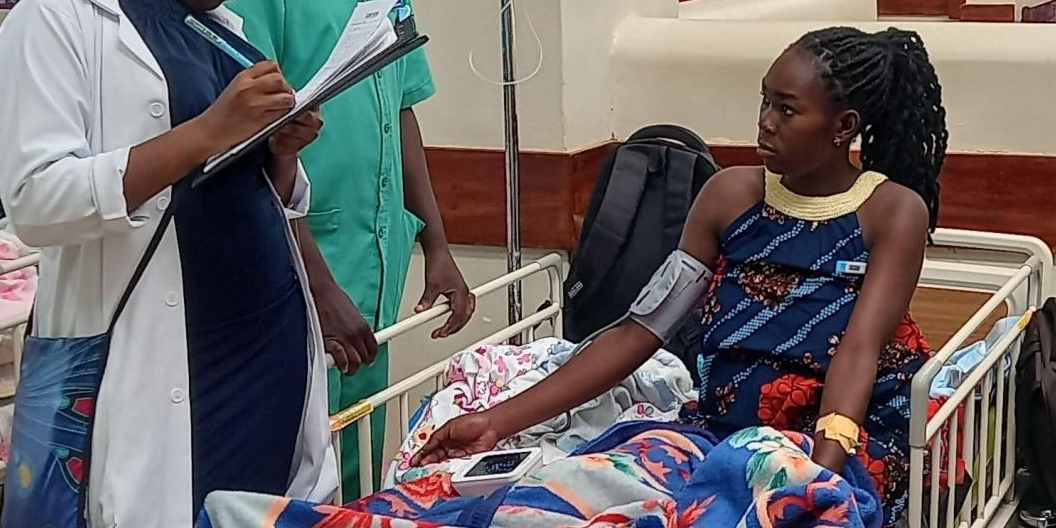In an astonishing medical journey, Scovia Aciro, a 25-year-old mother of three from Ayweri village in Gulu District, found herself embroiled in an intricate medical puzzle when she discovered her pregnancy almost two months after initial tests failed to detect her condition.
The narrative of her experience underscores the intricacies and triumphs of medical diagnosis and intervention.
The perplexing tale commenced with conflicting ultrasound results, leaving medical experts baffled as they grappled with unraveling Aciro’s extraordinary situation. The initial diagnosis would have led to an abortion, had it been accurate. However, the subsequent revelation of her pregnancy brought forth an entirely new set of challenges.
While Aciro’s first two pregnancies were uncomplicated, her third pregnancy presented a rare ectopic condition, a situation where a fertilized egg attaches outside the uterus, often in a fallopian tube. This condition can lead to life-threatening internal bleeding. As her health deteriorated, she was transferred from Paibona Health Centre III to Gulu Regional Referral Hospital.
The path ahead was riddled with obstacles. Initially, the hospital’s ultrasound machine was faulty, and upon its restoration, it failed to detect the unusual pregnancy. It wasn’t until July 28, 2023, that a definitive scan unveiled the ectopic pregnancy.
Aciro recounted her journey, stating, “I was first diagnosed with malaria, which was treated, but I started experiencing abdominal pain…sometimes it stops me from moving, neither can I step foot on the ground.” Her diagnostic journey culminated in a confirmed ectopic pregnancy, leading to surgery for its removal.
Dr. Francis Pebalo, a Gynecologist from Gulu University, spearheaded Aciro’s treatment, leading a team of healthcare professionals. The intricate case necessitated careful consideration and surgical intervention. Aciro’s baby was encased in her intestine, medically referred to as “omentum.” Through a meticulous surgical process, the medical team expanded the encasement and delicately delivered the baby girl through a cesarean section.
Dr. Pebalo expressed the uniqueness of the case, highlighting that incorrect initial diagnoses potentially saved the baby from termination. He shared, “It’s a miracle…we have this first case in the region where we can see life coming out.”
Despite the successful delivery, Aciro’s journey wasn’t without further challenges. The retained placenta necessitated additional surgery, impacting her ability to produce breast milk for her newborn. The hurdles were formidable, yet both Aciro and her baby displayed remarkable resilience.
Ectopic pregnancies often lead to terminations due to the threat they pose to mothers. Dr. Pebalo affirmed the rarity of Aciro’s situation, given that ectopic pregnancies typically result in termination. The significance of early antenatal care emerged as a crucial factor in averting complications, emphasizing the importance of timely healthcare visits for both maternal and fetal well-being.
The Gulu healthcare system employed innovative solutions, utilizing platforms like WhatsApp groups to facilitate communication among healthcare workers for swift referrals and consultations. While data on ectopic pregnancies in Uganda remains limited, cases are gradually being recognized and documented.
Dr. Richard Mughai, the Assistant Commissioner of Infant and Maternal Health in the Ministry of Health, reported that at least three cases of ectopic pregnancy have been registered this year. A 2013 study by Makerere University at Mulago Hospital revealed an upward trend in ectopic pregnancies, with tubal ectopic pregnancies comprising 84 percent of cases.
Raising awareness about associated risk factors remains paramount, as many affected mothers lack comprehensive knowledge of these factors. These encompass a range of aspects, including sexually transmitted diseases, drug abuse, pelvic inflammatory diseases, and misuse of family planning methods.



